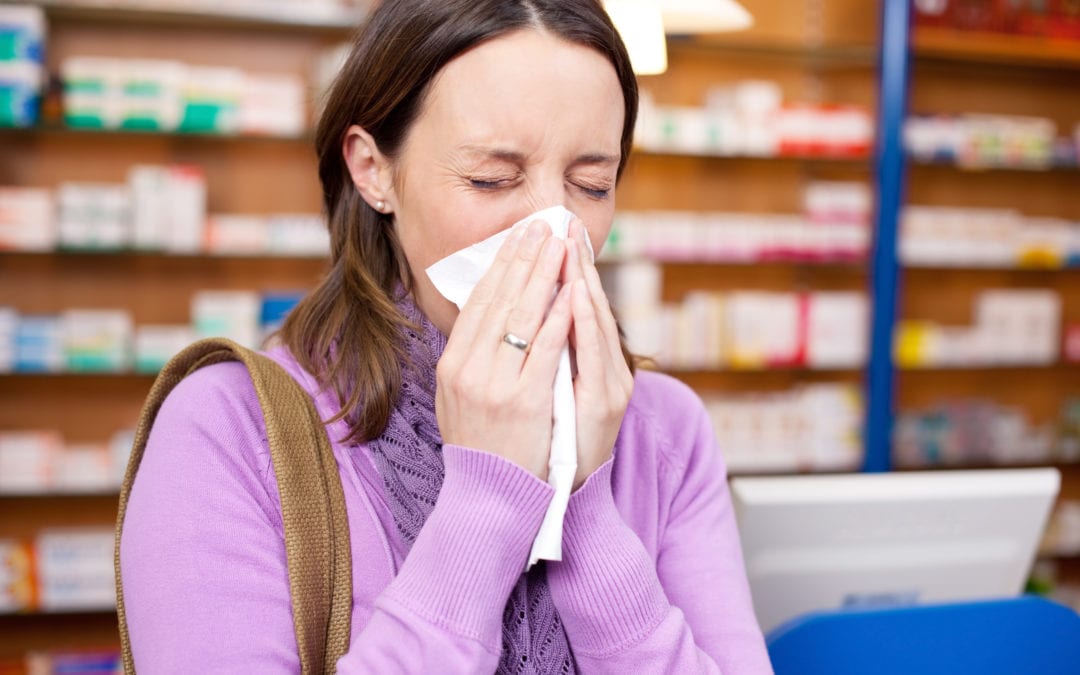Coughing, chills, body aches; it sounds like flu season. There’s no way to guarantee you won’t get the flu, but certain steps can help reduce the possibility. By learning more about the disease, what steps you can take to prevent it and what to do if you get sick, you can increase your chance of staying healthy or recovering more quickly.
What Causes Flu?
The flu is caused by a virus, or rather, a number of different virus strains. Viruses are tiny organisms that enter a host’s cells and force the DNA to start making copies of the virus. After multiplying itself many times, it leaves the cell, usually destroying the host cell in the process. Flu viruses are spread through the respiratory system. You can get infected by inhaling droplets from someone infected who is coughing or sneezing. You can also get the virus by touching a contaminated surface and then touching your face, particularly your eyes, nose or mouth.
Signs and Symptoms of Flu
Typical flu symptoms include the following:
- Fever, or feeling feverish without an increased temperature
- Chills
- Cough
- Sore throat
- Stuffy or runny nose
- Body or muscle aches
- Fatigue
- Headaches
- Vomiting
- Diarrhea, especially in children
It can be easy to mistake flu for the common cold, since many of the symptoms are the same. However, watch for the flu triad: muscle aches, feverish feelings and cough. Coughing is an especially tell-tale sign that you have the flu instead of a common cold.
Ways to Prepare for Flu Season
Stock up on supplies before flu season starts. Purchase tissues, hand sanitizer, hand soap and paper towels. Take a look at your medicine cabinet too. Replace anything that has expired and make sure you have pain relievers, decongestants, fever reducers, cough syrup and antihistamines. Test your thermometer batteries and clean your humidifier. You can also stock up your fridge and pantry. Plan lunches and dinners that will be easy to prepare, and purchase snacks and beverages.
Tips for Preventing Flu
Work to prevent infection with these practical tips:
- Get a flu shot – The CDC recommends that people older than six months get a flu shot. The vaccine is created each year to help protect against the strains of flu expected to be the most common. It’s usually available in October and it’s best to get it early, but any time during flu season is okay. Getting your whole family vaccinated is one of the best ways to keep flu out of your home.
- Avoid sick people – If you’re less than three feet away from someone coughing or sneezing, you can get infected.
- Don’t touch your face – Touching your face with infected hands quickly spreads flu viruses, so avoid touching your face without washing your hands first.
- Wash your hands – Wash your hands frequently, using the following proper technique. Use warm water and antibacterial soap. Lather for 20 seconds, paying particular attention to your fingers, fingernails and jewelry; this is about the time it takes to sing “Happy Birthday” twice. Rinse your hands well and dry them.
- Disinfect – Disinfecting items that get touched a lot, like doorknobs, phones and remote controls, helps stop the spread of viruses.
- Use hand sanitizer – Put bottles of hand sanitizer around your home and in your car so you can quickly and frequently clean your hands.
Tips for Staying Healthy
In addition to working to prevent flu, you can also take general steps toward staying healthy:
- Get enough sleep – Not sleeping well can weaken your immune system and make you more susceptible to catching the flu. Aim for seven to nine hours each night to keep your antibodies strong.
- Eat healthy foods – A well-balanced diet with fresh foods and lean protein can help strengthen the immune system and boost health.
- Work out – Exercise is a great way to help keep the immune system strong. But don’t overdo it; if you feel under the weather, stick with moderate exercise. And skip your workout completely if you have body aches, chest congestion or a stomach bug.
- Quit smoking – Smoking can decrease immune response and hinder the respiratory system.
- Stay hydrated – Proper hydration is important for many body functions. Carry a bottle of water with you and drink from it often.
What To Do if You Get the Flu
If you get sick, taking care of yourself can help minimize discomfort and help you recover more quickly.
- Stay home – Staying home gives you the opportunity to rest, and keeps you from spreading flu virus to others.
- Consider an antiviral drug – Antiviral drugs can help shorten sick time and reduce symptoms, so talk to your doctor about a prescription if you notice flu symptoms.
- Take pain relievers – Over-the-counter medications including acetaminophen and ibuprofen can help reduce fever.
- Rest – Get plenty of rest to help your immune system fight off the infection.
- Drink fluids – It’s easy to get dehydrated when you have the flu, so drink plenty of fluids including water, chicken soup and hot tea. A sports drink or other beverage with electrolytes is a good idea if you have a high fever or are vomiting.
When to Visit a Doctor
If your symptoms linger or get worse, or you’re concerned for other reasons, then visit a doctor. When in doubt, it’s better to seek professional medical advice.
Experiencing the flu is never fun, but by taking steps to prevent infection and taking care of yourself if you get sick, you can help stop the spread of flu viruses and improve your chance for staying healthy.

